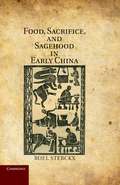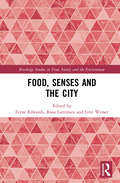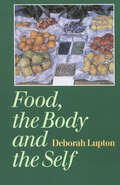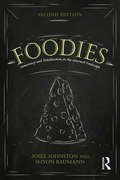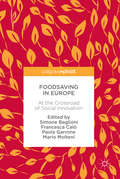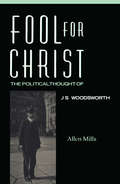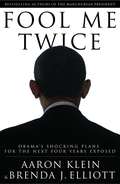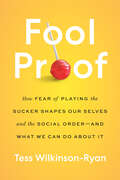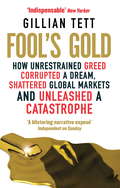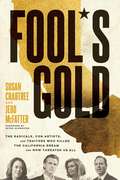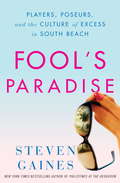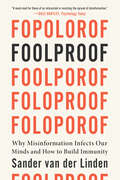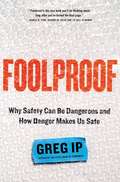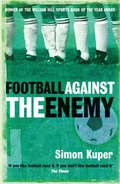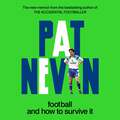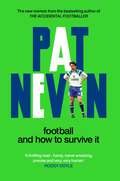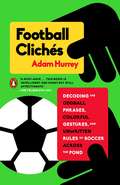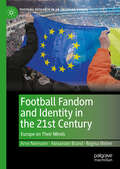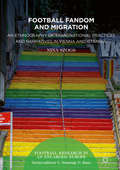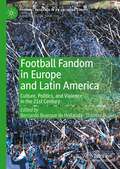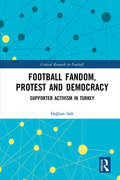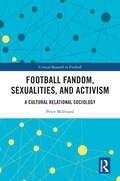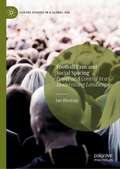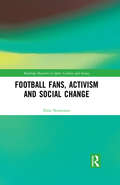- Table View
- List View
Food, Sacrifice, and Sagehood in Early China
by Roel SterckxIn ancient China, the preparation of food and the offering up of food as a religious sacrifice were intimately connected with models of sagehood and ideas of self-cultivation and morality. Drawing on received and newly excavated written sources, Roel Sterckx's book explores how this vibrant culture influenced the ways in which the early Chinese explained the workings of the human senses, and the role of sensory experience in communicating with the spirit world. The book, which begins with a survey of dietary culture from the Zhou to the Han, offers intriguing insights into the ritual preparation of food - some butchers and cooks were highly regarded and would rise to positions of influence as a result of their culinary skills - and the sacrificial ceremony itself. As a major contribution to the study of early China and to the development of philosophical thought, the book will be essential reading for students of the period, and for anyone interested in ritual and religion in the ancient world.
Food, Senses and the City (Routledge Studies in Food, Society and the Environment)
by Ferne Edwards Roos Gerritsen Grit WesserThis work explores diverse cultural understandings of food practices in cities through the senses, drawing on case studies in the Americas, Asia, Australia, and Europe. The volume includes the senses within the popular field of urban food studies to explore new understandings of how people live in cities and how we can understand cities through food. It reveals how the senses can provide unique insight into how the city and its dwellers are being reshaped and understood. Recognising cities as diverse and dynamic places, the book provides a wide range of case studies from food production to preparation and mediatisation through to consumption. These relationships are interrogated through themes of belonging and homemaking to discuss how food, memory, and materiality connect and disrupt past, present, and future imaginaries. As cities become larger, busier, and more crowded, this volume contributes to actual and potential ways that the senses can generate new understandings of how people live together in cities. This book will be of great interest to students and scholars of critical food studies, urban studies, and socio-cultural anthropology.
Food, the Body and the Self
by Deborah LuptonIn this wide-ranging and thought-provoking analysis of the sociocultural and personal meanings of food and eating, Deborah Lupton explores the relationship between food and embodiment, the emotions and subjectivity. She includes discussion of the intertwining of food, meaning and culture in the context of childhood and the family, as well as: the gendered social construction of foodstuffs; food tastes, dislikes and preferences; the dining-out experience; spirituality; and the `civilized' body. She draws on diverse sources, including representations of food and eating in film, literature, advertising, gourmet magazines, news reports and public health literature, and her own empirical research into people's preferences, memories, experiences and emotional responses to food. Food, the Body and the Self's strong interdisciplinary approach incorporates discussion of the work of a number of major contemporary social and cultural theorists, including Bourdieu, Elias, Kristeva, Grosz, Falk and Foucault.
Foodies: Democracy and Distinction in the Gourmet Foodscape (Cultural Spaces)
by Josee Johnston Shyon BaumannThis important cultural analysis tells two stories about food. The first depicts good food as democratic. Foodies frequent ‘hole in the wall’ ethnic eateries, appreciate the pie found in working-class truck stops, and reject the snobbery of fancy French restaurants with formal table service. The second story describes how food operates as a source of status and distinction for economic and cultural elites, indirectly maintaining and reproducing social inequality. While the first storyline insists that anybody can be a foodie, the second asks foodies to look in the mirror and think about their relative social and economic privilege. By simultaneously considering both of these stories, and studying how they operate in tension, a delicious sociology of food becomes available, perfect for teaching a broad range of cultural sociology courses.
Foodsaving in Europe
by Simone Baglioni Francesca Calò Paola Garrone Mario MolteniThis book provides comparative, multi-disciplinary research on the surplus food distribution in Europe and its relation to food poverty, with a focus on the interaction of for-profit and non-profit organisations. It offers an informed and rich discussion in understanding the collaboration between profit and non-profit organisations involved in food recovery dynamics, and provides understanding as to how the two types of players create effective, innovative and sustainable processes. Building on sociology, food justice, and sustainable management fields, the book will be of interest to a diverse range of scholars, policy makers and practitioners inspiring innovation in how to address food poverty through surplus food recovery.
Fool For Christ
by Allen MillsJames Shaver Woodsworth (1874-1942) stands as one of the half-dozen most important national political figures in twentieth-century Canadian history. Allen Mills acknowledges his outstanding achievements while providing a critical account of the Woodsworth legacy and revising the received opinion of him as a man of unbending conviction and ever-coherent principle.A product of western Canada's pioneer society and a stern Methodist household, Woodsworth grew up to make his way into social service and politcal action. A member of parliament for over twenty years, he rejected the traditional forms of political activity, seeking a new politics and a new political party. The latter turned out to be the Co-operative Commonwealth Federation founded in 1932. Its first leader was Woodsworth himself.In a crucial period between the World Wars, Woodsworth helped define the character of the modern Canadian, non-Marxist Left and of many of Canada's important economic and social institutions. Among them are the welfare state, the Bank of Canada, and Canada's internationalist role in the contemporary world. Disclaimer: Quotes by T.S. Eliot, F.R. Scott, and Louis MacNeice removed at the request of the rights holder.
Fool Me Twice: Obama's Shocking Plans for the Next Four Years Exposed
by Aaron Klein Brenda J. ElliottThis is the game changing book reveals the blueprint for a second term that President Obama and his progressive backers don't want you to know. Months of painstaking research into thousands of documents have enabled investigative journalists and New York Times bestselling authors Aaron Klein and Brenda J. Elliott to expose the secret template for Obama's next four years -- the one actually created by Obama's own top advisers and strategists. Just as Obama concealed the true plans for his initial term behind rhetoric of ending partisan differences and cutting the Federal deficit, Obama's re-election theme of creating jobs conceals more than it reveals about his real agenda for a second term. All the main areas of domestic policy are covered -- jobs, wages, health care, immigration overhaul, electoral "reform," national energy policy. Each of the plans exposed seek to permanently remake America into a government-dominated socialist state. Here are just a few samples from dozens upon dozens of specific schemes unveiled herein: Detailed plans to enact single-payer health care legislation controlled by the Federal government regardless of any Supreme Court decision to overturn Obamacare; The recreation of a 21st century version of FDR's Works Progress Administration (WPA) program within the Department of Labor that would oversee a massive new bureaucracy and millions of new Federal jobs; Further gutting of the U. S. military in shocking ways, while using the "savings" for a new "green" stimulus program and the founding of a Federal "green" bank to fund so-called environmentally friendly projects; The vastly reduced resources of the U. S. Armed Forces will be spread even thinner by using them to combat "global warming," fight global poverty, remedy "injustice," bolster the United Nations and step up use of "peacekeeping" deployments; An expansive new amnesty program for illegal aliens linked with a reduction in the capabilities of the U. S. Border Patrol and plans to bring in untold numbers of new immigrants with the removal of caps on H-1B visas and green cards. Fool Me Twice is based on exhaustive research into the coming plans and presidential policies as well as the specific second term recommendations of the major "progressive" groups behind Barack Obama and the Democratic leadership - the organizations that help to craft the legislation and set the political and rhetorical agenda for the president and his allies. While many have general concerns about Obama's second-term ambitions, Fool Me Twice lays bare the devastating details of a second Obama presidency. If he wins re-election in 2012, the America of equal opportunity for all, Constitutionally-limited government, economic freedom and personal liberty will be but a distant memory.
Fool Proof: How Fear of Playing the Sucker Shapes Our Selves and the Social Order—and What We Can Do About It
by Tess Wilkinson-RyanThe fear of playing the fool is a universal psychological phenomenon and an underappreciated driver of human behavior; in the spirit of Malcolm Gladwell’s Blink, Dan Ariely’s Predictably Irrational, and Susan Cain’s Quiet, Fool Proof tracks the implications of the sucker construct from personal choices to cultural conflict, ultimately charting an unexpected and empowering path forward.In the American moral vernacular, we have a whole thesaurus for victims of exploitation. They are suckers (born every minute), fools (not suffered gladly), dupes, marks, chumps, pawns, and losers. Fool me once, shame on you; fool me twice, shame on me. Cultural stories about suckers abound too: the Trojan Horse, the Boy Who Cried Wolf, the Emperor’s New Clothes, even Hansel and Gretel. If you believe that, I have a bridge to sell you. Don’t go out with him; he only wants one thing. The fear of playing the fool is not just a descriptive fact; it is a prescriptive theme: Don’t let that be you. Most of us are constantly navigating two sets of imperatives: how to be successful and how to be good. The fear of being suckered whispers that you can’t do both, operating as a quiet caution against leaps of faith and acts of altruism. University of Pennsylvania law professor and moral psychologist Tess Wilkinson-Ryan brings evidence from studies in psychology, sociology, and economics to show how the sucker construct shapes, and distorts, human decision-making. Fool Proof offers the first in-depth analysis of the sucker’s game as implicit worldview, drawing evidence everywhere from grocery shopping to international trade deals, from road rage to #MeToo. Offering real-world puzzles and stories, Wilkinson-Ryan explores what kinds of hustles feel like scams and which ones feel like business as usual, who gets pegged as suckers and who gets lauded as saints. She takes deep dives into areas like the psychology of stereotyping, the history of ethnic slurs, and the economics of the family—and shows how the threat of being suckered is deployed to perpetuate social and economic hierarchies. Ultimately, Fool Proof argues that the goal is not so much to spot the con as to renegotiate its meaning. The fear of being suckered can be weaponized to disrupt cooperation and trust, but it can also be defused and reframed to make space for moral agency and social progress. Facing the fear of being suckered head-on means deciding for ourselves what risks to take, what relationships to invest in, when to share, and when to protest—drafting a new template for how to live with integrity in a sucker’s world.
Fool's Gold: How Unrestrained Greed Corrupted a Dream, Shattered Global Markets and Unleashed a Catastrophe
by Gillian Tett'A truly gripping narrative . . . The fact that Tett is able to reproduce such raw private communications is a tribute to her journalistic abilities' Dominic Lawson, Sunday Times'Her blow-by-blow story is an impressive piece of detective work. She pulls back the curtain on a closed, unaccountable world of finance' Will Hutton, GuardianIn the mid 1990s, at a vast hotel complex on a private Florida beach, dozens of bankers from JP Morgan gathered for what was to become a legendary off-site meeting. It was a wild weekend. But among the drinking, nightclubbing and fist-fights lay a more serious purpose - to assess the possibility of building a business around the new-fangled concepts of credit derivatives.The group at the heart of this revolution was an intense team, made up of individuals with a supreme sense of loyalty to each other and to the bank - for years, nothing could break them apart. But when, finally, the team dispersed, the innovations spread far beyond their original intentions, producing perversions in the mortgage market that ultimately culminated in disaster. Part real-life thriller, part investigation and exposé, this searing narrative takes us deep inside the shadowy world of complex finance - a perfect storm for the credit crunch
Fool's Gold: The Radicals, Con Artists, and Traitors Who Killed the California Dream and Now Threaten Us All
by Susan Crabtree Jedd McFatterAn investigation that shows how the most ambitious figures in the Democratic Party want to transform the rest of America into the progressive dystopia that is California. Take a close look at today&’s Democratic Party power brokers and you&’ll quickly realize most of them share one thing in common: California. Residents are fleeing the Golden State in droves. Catastrophic wildfires—fueled by years of corruption and collusion between elected officials and colossal utility companies—continue to devastate communities. The state's homelessness crisis is the worst in the country. Drug-related deaths are skyrocketing. And violent crime and smash-and-grab retail theft is now commonplace. For too many across the state, pursuing the Californian Dream is now a fool&’s errand. But what people don't know is what&’s driving these failures, why California&’s leaders have allowed them to spiral and how this contagion could spread to every other city and town in the United States if it isn&’t exposed for what it is: failed far-left social experiments. From the investigative research team behind Peter Schweizer&’s runaway bestsellers comes Fool&’s Gold, a hard-hitting work of journalism that tells the untold story of the dark side of the Democratic Party&’s Californian elites and the toll they&’ve taken on the entire country. One of Schweizer&’s top investigators, Jedd McFatter, has teamed up with award-winning investigative journalist Susan Crabtree to expose the most powerful names in politics: Gavin Newsom, Kamala Harris, Nancy Pelosi, and Adam Schiff, among others. Their investigation exposes: • The most powerful and ambitious politicians and family dynasties and their questionable association with convicted criminals and unsavory business partners. • World-class con artists and their schemes to defraud, plunder, and literally poison the people and institutions of America—including the illegal alien drug dealers getting rich and avoiding prison and deportation while killing Americans with fentanyl and other illicit drugs. • Myriad schemes in which officials line their own pockets and sell out to the Chinese government, along with other foreign interests. • You&’ll see how California&’s elites retain political power at the national and international scale through secrecy and deception. How did the Golden State become this tarnished? And more importantly, why is California&’s corrosion continuing? This explosive book warns that Gavin Newsom is actually right when he often declares, &“As goes California, so goes the nation.&” America&’s future is inextricably tied to California because of its sheer size and the enormous influence of its political figures who remain dead set on controlling the White House for decades to come—and turning the rest of America into California. It&’s a story the mainstream media would prefer to keep hidden.
Fool's Paradise: Players, Poseurs, and the Culture of Excess in South Beach
by Steven GainesFrom the acclaimed bestselling author of Philistines at the Hedgerow comes a remarkably revealing profile of the Miami Beach no one knows, a tale of fabulous excess, thwarted power, and rekindled lives that will take its place among the decade's best works of social portraiture. Created from a mix of swampland and dredged-up barrier reef, Miami Beach has always been one part drifter-mecca and one part fantasyland, simultaneously a catch basin for con men, fast-talk artists, and shameless self-promoters, and a Shangri-La for sun worshippers and hardcore hedonists. In Miami Beach it's often said that "if you're not indicted you're not invited." But the city's mad, fascinating complexity resists easy stereotyping. Fool's Paradise is more than just a present-day profile of a dark Eden. Gaines journeys back into the city's social and cultural history, unearthing stories of the resort's past that are every bit as absorbing and jaw-dropping as those of its present. The book begins with a snapshot of the city's current excess (this is, after all, a sun-washed hamlet that boasts, on a per capita basis, more bars and breast implants than any other place in America), then plunges into the Beach's origins, chronicling the audacious rise of such hoteliers as the Fontainebleau's Ben Novack and the Eden Roc's Harry Mufson, the sharp-elbowed tactics of Al Capone and Frank Sinatra, and the Mac-10 shooting sprees of the Marielito and Colombian drug lords. From there, the narrative shifts to two wildly eccentric souls who gave their lives to preserving the city's architectural dazzle and creating its color palette, introduces us to "the Most Powerful Man in Miami Beach," and arrives finally in the modern day, where we meet, among others, a kinky German playboy who once owned a quarter of South Beach and publicly flaunts his sexual escapades; a fabulously successful nightclub promoter whose addictive past seems to have given him a portal into the night world's id; and a gaggle of young sexy models, dreamers, and schemers on a mission to achieve significance. Evoking the Beach's surreal blend of flashy Vegas and old Hollywood glamour, as well as its manic desperation and reckless wealth, Gaines persuasively demonstrates that though the Beach is in the words of its most famous drag queen: "an island of broken toys ... a place where people get away with things they'd never get away with anyplace else," it casts an irresistible spell.
Foolproof: Why Misinformation Infects Our Minds And How To Build Immunity
by Sander van der LindenWinner of the SPSP Book Prize for the Promotion of Social and Personality Science • Winner of the 2024 APA William James Book Award • Winner of the 2024 Harvard Goldsmith Book Prize • Winner of the 2024 Nautilus Book Award • A Next Big Idea Club Must-Read • A Financial Times Best Book of the Year • One of Nature’s best science picks • One of Behavioral Scientist’s Notable Books of 2023 Informed by decades of research and on-the-ground experience advising governments and tech companies, Foolproof is the definitive guide to navigating the misinformation age. From fake news to conspiracy theories, from inflammatory memes to misleading headlines, misinformation has swiftly become the defining problem of our era. The crisis threatens the integrity of our democracies, our ability to cultivate trusting relationships, even our physical and psychological well-being—yet most attempts to combat it have proven insufficient. In Foolproof, one of the world’s leading experts on misinformation lays out a crucial new paradigm for understanding and defending ourselves against the worldwide infodemic. With remarkable clarity, Sander van der Linden explains why our brains are so vulnerable to misinformation, how it spreads across social networks, and what we can do to protect ourselves and others. Like a virus, misinformation infects our minds, exploiting shortcuts in how we see and process information to alter our beliefs, modify our memories, and replicate at astonishing rates. Once the virus takes hold, it’s very hard to cure. Strategies like fact-checking and debunking can leave a falsehood still festering or, at worst, even strengthen its hold. But we aren’t helpless. As van der Linden shows based on award-winning original research, we can cultivate immunity through the innovative science of “prebunking”: inoculating people against false information by preemptively exposing them to a weakened dose, thus empowering them to identify and fend off its manipulative tactics. Deconstructing the characteristic techniques of conspiracies and misinformation, van der Linden gives readers practical tools to defend themselves and others against nefarious persuasion—whether at scale or around their own dinner table.
Foolproof: Why Safety Can Be Dangerous and How Danger Makes Us Safe
by Greg IpHow the very things we create to protect ourselves, like money market funds or anti-lock brakes, end up being the biggest threats to our safety and wellbeing. We have learned a staggering amount about human nature and disaster -- yet we keep having car crashes, floods, and financial crises. Partly this is because the success we have at making life safer enables us to take bigger risks. As our cities, transport systems, and financial markets become more interconnected and complex, so does the potential for catastrophe.How do we stay safe? Should we? What if our attempts are exposing us even more to the very risks we are avoiding? Would acceptance of danger make us more secure? Is there such a thing as foolproof? In FOOLPROOF, Greg Ip presents a macro theory of human nature and disaster that explains how we can keep ourselves safe in our increasingly dangerous world.
Football Against The Enemy: Football Against The Enemy
by Simon KuperThe classic winner of the William Hill Sports Book of the Year Award'None matches this global examination for originality, breadth and sheer courage' MAIL ON SUNDAY'If you like football, read it. If you don't like football, read it' THE TIMESThroughout the world, football is a potent force in the lives of billions of people. Focusing national, political and cultural identities, football is the medium through which the world's hopes and fears, passions and hatreds are expressed. Simon Kuper travelled to 22 countries from South Africa to Italy, from Russia to the USA, to examine the way football has shaped them. At the same time he tried to find out what lies behind each nation's distinctive style of play, from the carefree self-expression of the Brazilians to the anxious calculation of the Italians. During his journeys he met an extraordinary range of players, politicians and - of course - the fans themselves, all of whom revealed in their different ways the unique place football has in the life of the planet.
Football And How To Survive It (Pat Nevin Books)
by Pat Nevin'The good news for those who loved THE ACCIDENTAL FOOTBALLER: this new book is even better. There were times as I read Pat Nevin's account of his years running - or, trying to run - Motherwell, I had to remind myself to breathe. It's a thrilling read - funny, nerve-wracking, precise and very, very human' - Roddy DoyleSo, you fell into football by accident. You've played for Chelsea, Everton and your country at an international level. But what happens when you discover you're in so deep that football has taken over your whole life?In his brilliant new memoir, Pat Nevin takes us on a journey to the less glamorous side of football. From Tranmere to Kilmarnock, he plays some of the best football he's ever played. Then, in an unprecedented twist of fate, finds himself both player and Chief Executive of Scottish First Division club Motherwell.What follows is an entertaining and revealing tale of the side of football that you rarely see as Pat tries to keep the lid on simmering tensions between owner and the manager; travels in Lear jets one moment, but has to sell off half the team, the next. So much is madness, like being the manager's boss, and his player at the same time; or discovering that the ground's goalposts are higher on one side than on the other!And with impossible challenges at every corner, such as learning that their son is autistic, and the club hurtling towards administration, Pat strives to walk the impossible line between player, parent and boss.FOOTBALL AND HOW TO SURVIVE IT is a real one-off, uncovering the sport in all its complex, confusing and calamitous glory. Once you've read it, you may never look at the game in the same way again.
Football And How To Survive It (Pat Nevin Books)
by Pat Nevin'The good news for those who loved THE ACCIDENTAL FOOTBALLER: this new book is even better. There were times as I read Pat Nevin's account of his years running - or, trying to run - Motherwell, I had to remind myself to breathe. It's a thrilling read - funny, nerve-wracking, precise and very, very human' - Roddy DoyleSo, you fell into football by accident. You've played for Chelsea, Everton and your country at an international level. But what happens when you discover you're in so deep that football has taken over your whole life?In his brilliant new memoir, Pat Nevin takes us on a journey to the less glamorous side of football. From Tranmere to Kilmarnock, he plays some of the best football he's ever played. Then, in an unprecedented twist of fate, finds himself both player and Chief Executive of Scottish First Division club Motherwell.What follows is an entertaining and revealing tale of the side of football that you rarely see as Pat tries to keep the lid on simmering tensions between owner and the manager; travels in Lear jets one moment, but has to sell off half the team, the next. So much is madness, like being the manager's boss, and his player at the same time; or discovering that the ground's goalposts are higher on one side than on the other!And with impossible challenges at every corner, such as learning that their son is autistic, and the club hurtling towards administration, Pat strives to walk the impossible line between player, parent and boss.FOOTBALL AND HOW TO SURVIVE IT is a real one-off, uncovering the sport in all its complex, confusing and calamitous glory. Once you've read it, you may never look at the game in the same way again.
Football And How To Survive It (Pat Nevin Books)
by Pat Nevin'The good news for those who loved THE ACCIDENTAL FOOTBALLER: this new book is even better. There were times as I read Pat Nevin's account of his years running - or, trying to run - Motherwell, I had to remind myself to breathe. It's a thrilling read - funny, nerve-wracking, precise and very, very human' - Roddy DoyleSo, you fell into football by accident. You've played for Chelsea, Everton and your country at an international level. But what happens when you discover you're in so deep that football has taken over your whole life?In his brilliant new memoir, Pat Nevin takes us on a journey to the less glamorous side of football. From Tranmere to Kilmarnock, he plays some of the best football he's ever played. Then, in an unprecedented twist of fate, finds himself both player and Chief Executive of Scottish First Division club Motherwell.What follows is an entertaining and revealing tale of the side of football that you rarely see as Pat tries to keep the lid on simmering tensions between owner and the manager; travels in Lear jets one moment, but has to sell off half the team, the next. So much is madness, like being the manager's boss, and his player at the same time; or discovering that the ground's goalposts are higher on one side than on the other!And with impossible challenges at every corner, such as learning that their son is autistic, and the club hurtling towards administration, Pat strives to walk the impossible line between player, parent and boss.FOOTBALL AND HOW TO SURVIVE IT is a real one-off, uncovering the sport in all its complex, confusing and calamitous glory. Once you've read it, you may never look at the game in the same way again.
Football Clichés
by Adam HurreyA fun, intelligent, and useful guide to understanding the nuanced language of soccer Every week, year-round, legions of devoted soccer fans across the country rise at the crack of dawn or quietly sneak out of work to watch their favorite teams play across the pond--complete with a soundtrack of two cheeky Englishmen spouting a stream of trite phrases and curious words that make maddeningly little sense. They'll chat about flying teacups and cultured left feet, or point out a player who's jinking through the corridor of uncertainty, hoping to bag one with aplomb. Confused? Many Brits are, too.In Football Clichés, London-based soccer writer Adam Hurrey amusingly translates the idioms of the sport, from the quaint to the ridiculous. Here you'll find words for parts of the field and parts of the body; for ways to score a goal and ways to run, walk, or fake an injury. You'll learn to read the shifting moods of fans at a soccer match and encounter the game's oddly expressive gestures, which include the muted celebration and the beleaguered manager clap. Perfect for the die-hard or fair-weather fan, Football Clichés celebrates the world of soccer in all its glory.
Football Fandom and Identity in the 21st Century: Europe on Their Minds (Football Research in an Enlarged Europe)
by Arne Niemann Alexander Brand Regina WeberThis book uncovers the elusive phenomenon of football fan identities by using a combination of comparative analysis and triangulation of data obtained through discourse analysis of online message boards and survey research in four European country/league contexts and in-depth interviews conducted in eight select fan scenes. The book illustrates that politically relevant developments are often set in motion in supposedly peripheral social fields, and that identities are adapted and transboundary linkages can be established and nurtured through the game of football. The book will be of interest to researchers, scholars and students of Sociology, Political Science, Sport Studies, European Studies and International Relations.
Football Fandom and Migration
by Nina SzogsThis book studies how transnationalisation, Europeanisation and migration processes intersect with football fandom, through an analysis of the transnational narratives and practices of Fenerbah#65533;e and Galatasaray football fans in Vienna, Austria. Based on ethnographic fieldwork in Austria, Turkey and Germany, the author analyses the ways in which narratives about football fandom are often linked to migrant experiences, including practices of (self‑)culturalization in the diasporic context in Austria. The book shows how constructed ethnicities and also masculinities and femininities meet in football fan performances and in the construction of what makes a "proper" football fan. Turkish football fandom is a field where powerful prejudices and stereotypes amalgamate and interact. This study enables the reader to look into migration processes and discussions about related topics from a different angle: the love of a football club. Football Fandom and Migration will be of interest to students and scholars across a range of disciplines, including anthropology, sociology, European studies, political sciences, gender studies, leisure studies, sport sociology and history.
Football Fandom in Europe and Latin America: Culture, Politics, and Violence in the 21st Century (Football Research in an Enlarged Europe)
by Bernardo Buarque de Hollanda Thomas BussetThis book combines pieces of work on Europe and Latin America, the two continents where football arouses the most ardent passions among its spectators. Curiously, an undertaking to compare on a large scale the forms extreme fandom takes in these two geographical areas is still lacking. A situational analysis of the scientific literature devoted to the subject over the last two or three decades represents a step in this direction, making a scattered store of knowledge accessible. It thus answers a need to clarify regional differences in identities and in the practices of supporters.
Football Fandom, Protest and Democracy: Supporter Activism in Turkey (Critical Research in Football)
by Dağhan IrakFootball Fandom, Protest and Democracy offers an in-depth and inside approach to the socio-political history of football in Turkey, where fandom is often revered as part of the national identity, presenting the historical context for football events in the country. Based on original research, the book explores the complex political processes at play in modern Turkey and deepens our understanding of fandom, fan activism and protest movements, questioning all presuppositions about the society and football fandom in Turkey. In particular, it examines the role of football fans in the pro-democracy Gezi Protests of 2013, the history of football in Turkey, the sociology of middle-classes and the transformation of football in the country. Interdisciplinary in nature, this book is a valuable resource for scholars and students of sports sociology, popular culture studies, Turkish studies and media studies.
Football Fandom, Sexualities and Activism: A Cultural Relational Sociology (Critical Research in Football)
by Peter MillwardThis is the first book to examine the growing movement of organised networks of LGBT+ football supporters, exploring activists’ biographies and the meanings they ascribe to participation in identity politics-centred social movements. The book draws upon in-depth original research into the Pride in Football LGBT+ football supporters’ network in the UK, alongside comparative material from other countries. It is also the first book to apply a cultural relational sociological framework to the study of football fans and supporters’ groups, marking an important theoretical step forward that opens up new perspectives in the sociology of sport, the sociology of collective action and social movements, and the sociologies of genders and sexualities in the twenty-first-century world. As the struggle for cultural rights and recognition of LGBT+ communities continues, with football fandom providing an important site for understanding these issues given its historically embedded hegemonic masculine culture, and in the aftermath of gay male football player Jake Daniels’ ‘coming out’ in May 2022, the book offers timely insights into new social movements, the consumption of sport, and the experiences of people from a diversity of sexualities. This is fascinating reading for anybody with an interest in the sociology of sport, football, fandom, gender, sexualities, social theory, or social movements.
Football Fans and Social Spacing: Power and Control in a Modernising Landscape (Leisure Studies in a Global Era)
by Ian WoolseyThis book is about the relationship between leisure and power. More specifically, it theorizes a group of supporters’ attempts to control social space within and around English football stadiums. Not only is football a popular leisure form, it is also one which has undergone a remarkable process of transformation during the last 30 years. Advance surveillance techniques, all seater-stadia, rising ticket prices, and a growing intolerance to expressive modes of fandom have all transformed the experience of watching the professional game.Through these five chapters, Ian Woolsey asks how the collective responses of travelling football supporters to these major societal currents and changes within the game; liquid modernity and the post-1989 transformation of English football, are managed via the distinct and oft-competing processes of social spacing in football. An important inspiration for the book is the work of Zygmunt Bauman, particularly his ideas on cognitive, aesthetic, and moral ‘spacings’ as a social production. Ian Woolsey’s powerful and persuasive application of these ideas not only extends Bauman’s focus on the ‘politics’ of power in public space to include a consideration of leisure but in so doing shows that ethnography, selectively conducted and theoretically informed, can provide data for a rich, sociological account of a football world. The book will be of interest to researchers and scholars of sociology of leisure, sociology of sport, criminology, and cultural studies.
Football Fans, Activism and Social Change (Routledge Research in Sport, Culture and Society)
by Dino NumeratoThe study of football fandom is a fast-growing area of research in the sociology of sport. The first work of its kind, this book explores football fan activism and its impact on contemporary football culture in England, Italy and the Czech Republic. Presenting a comparative study of fan activism in national and transnational contexts, it explores the characteristics of each country’s football fan culture as well as the varying and at times volatile dynamics between fans, authorities and the mass media. Its chapters address key themes and issues including: fans’ reactions to policing and security measures in football stadiums; the socio-cultural significance of symbols and rituals for fans at football games; and fans’ critical engagement with football club ownership and management. Offering original insights into the power of fan activism to influence social change, this book has wider implications for understanding social movements in other cultural and political spheres beyond Europe. Football Fans, Activism and Social Change is fascinating reading for all students, scholars and football fans with an interest in sport studies, fan culture, politics and society.
